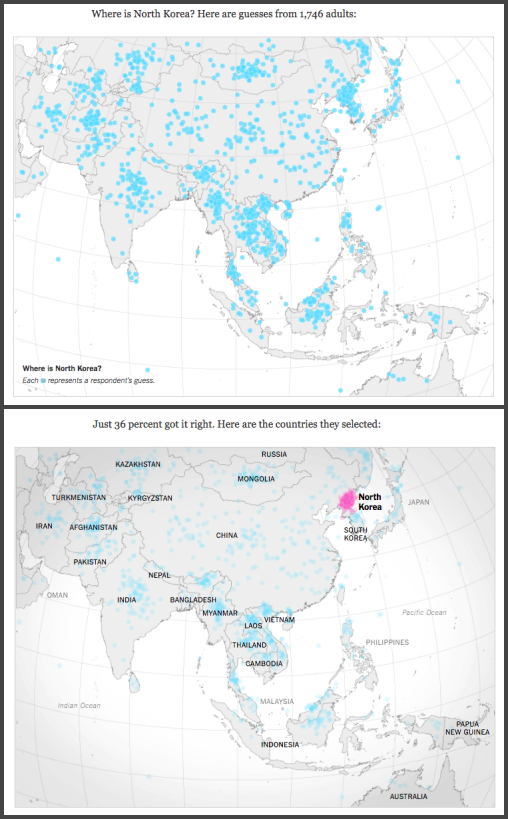There’s an old joke that God created war to teach man geography.
Though the saying is old, and its origin not entirely certain, it may prove relevant in the near future given the escalation of hostilities between the United States and North Korea and the fact a recent study showed an embarrassing number of Americans can’t locate the Hermit Kingdom on a map.
The study, which was conducted from April 27-29 by the Morning Consult, found that only 36 percent of the 1,746 surveyed adults could find North Korea on a map.
“Education was a major factor in participants’ ability to find North Korea. Those with postgraduate degrees had among the most success; the only ones who did better were people who said they knew someone of Korean ancestry. Those who had visited or been to a foreign country were also much more likely to find North Korea than those who had not,” the New York Times’ Upshot blog reported.

Image courtesy: Upshot
Interestingly enough, two specific demographic groups stood out as being the least informed of the East Asian country’s whereabouts: Democrats and baby boomers.
“After the highly educated, the next most successful group was older people: Nearly half of respondents 65 and older found North Korea. The Korean War, which ended in 1953, may be in the memory of today’s older seniors,” the report noted.
It added, “On average, Republicans — and Republican men in particular — were more likely to correctly locate North Korea than Democratic men. And Republicans were more likely to be in favor of almost all the diplomatic solutions posed by the researchers. (Women tended to find North Korea at similar rates, regardless of party.)”
The study, which was also conducted at the request of the New York Times, found that views on how the U.S. should deal with North Korea varied greatly depending on whether the respondent knew where the latter was located.
For those who could ID North Korea on an unmarked map, they “tended to view diplomatic and nonmilitary strategies more favorably than those who could not,” Upshot noted. “These strategies included imposing further economic sanctions, increasing pressure on China to influence North Korea and conducting cyberattacks against military targets in North Korea.”
“They also viewed direct military engagement — in particular, sending ground troops — much less favorably than those who failed to locate North Korea,” it added.
The biggest takeaway, aside from the fact a distressing number of Americans have no idea where North Korea is, is that those who could ID it on a map strongly disagreed with the suggestion the U.S. should do nothing about the defiant and confrontational tyrant state.

